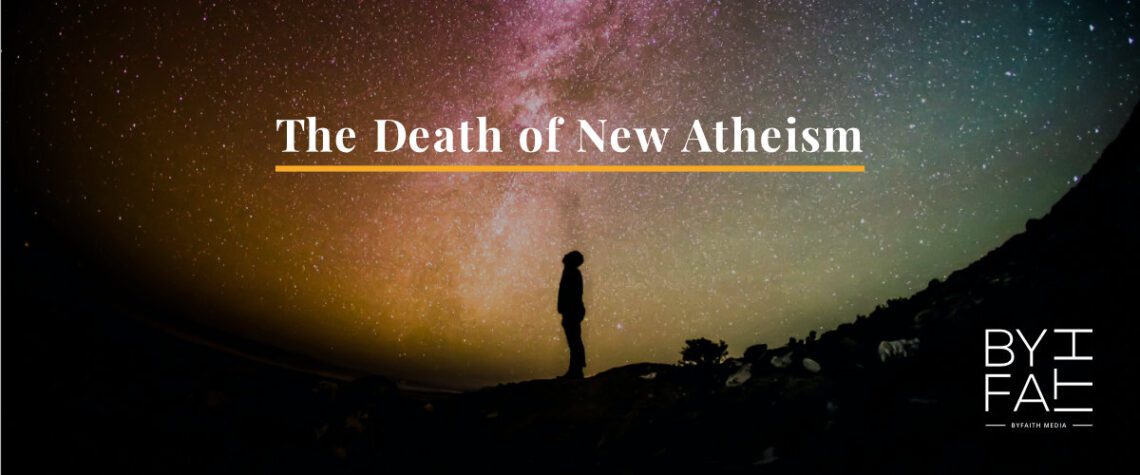
The Death of New Atheism, God’s Undertaker by John Lennox
God’s Undertaker by John Lennox: Coupling Faith and Science
The fiery ‘New Atheism’ movement, spearheaded by figures like Richard Dawkins has now faded into an embarrassing flop, with militant atheism laying the foundation for gender confusion, woke chaos and a post-truth age of ‘feelings’ as the new science. The inability of Richard Dawkins and his atheists to foresee this chaos or hold it back, has led people back to talking about the power of faith to restrain evil.
How you are fallen from heaven, O Lucifer, son of the morning! How you are cut down to the ground, you who weakened the nations!
– Isaiah 14:12
Atheism fails to explain big questions like how the universe began, why it seems perfectly suited for life, and where life, consciousness, reason, truth, morality and spirituality come from. These complex mysteries highlight enormous flaws in atheistic perspectives.
In the beginning was the Word (Logos), and the Word (Logos) was with God, and the Word (Logos) was God
– John 1:1
Consciousness, the ability to think, feel and experience, seems vastly different from lifeless matter, yet atheism typically assumes it arose from purely physical processes without a guiding intelligent source.
The problem of consciousness poses a huge challenge for atheism, as it fails to explain how a non-conscious, unintelligent universe could produce human awareness and intelligence
This raises a tough question: how can complex minds capable of reasoning and understanding truth emerge from non-intelligent, random forces? The gap between lifeless matter and conscious intelligence remains a deep mystery that atheistic views struggle to comprehend.
I think, therefore I am
– René Descartes
The question of how hydrogen, a simple non-conscious element, becomes sentient is a major challenge for atheism. No one fully understands how lifeless matter turns into conscious beings with thoughts and feelings. Atheism, which avoids non-material explanations, struggles to explain how non-intelligent atoms like hydrogen create intelligence and awareness, leaving a big gap in understanding consciousness.
Where did consciousness arise?… The universe started off as basically quarks and leptons, and it quickly became hydrogen and helium, lithium, like, basically elements of the periodic table. But it was mostly hydrogen, basically… years later that hydrogen became sentient. Where along the way did consciousness… What’s the line of consciousness and not consciousness between hydrogen and here?
– Elon Musk, Joe Rogan Podcast, March 2021
John Lennox (Emeritus Professor of Mathematics at the University of Oxford) offers us an alternative view to blind atheism in his book, God’s Undertaker: Has Science Buried God? tackling the flaws of New Atheism’s commitment to exclude God and the weakness of Dawkins’ ideology, providing vigour to the growing confidence that science and faith can, and always have, operated together.
In Greek the word translated ‘Word’ is Logos, which was often used by Greek philosophers for the rational principle that governs the universe. Here we have the theological explanation for the rational intelligibility of the universe, for the fine-tuning of its physical constants and its word-like biological complexity. It is the product of a Mind, that of the divine Logos
– God’s Undertaker by John Lennox
Lennox argues that there are a few key issues with how atheists, particularly those subscribing to a purely naturalistic view, understand the world through a limited ideological window:
- Insufficient Explanation: Lennox explains that strict naturalism, which attributes everything to natural processes, fails to answer fundamental questions. He argues that the origin of the universe and the existence of fundamental laws themselves remain unexplained if everything is purely natural. ‘If naturalism is true, then the question of origins is ultimately meaningless,’ says Lennox.
- Undermines the Basis of Science: Lennox suggests that a purely naturalistic worldview undermines the very foundation of science – rationality. If our brains, the tools of scientific inquiry, are simply products of random chance, how can we trust their ability to understand the universe objectively? ‘The atheist scientist… believes that the brain or mind with which we do science is the end product of a mindless unguided process… you can’t get something from nothing,’ he says.
- Misinterprets the Absence of Evidence: Lennox criticises atheists like Richard Dawkins for mistaking the lack of scientific evidence for God as evidence for God’s non-existence. Science, by its nature, deals with the observable and testable. The existence of God, according to Lennox, doesn’t fall under that category. ‘Dawkins claims that a good hypothesis can be distinguished from a bad one… on the grounds that the good hypothesis can be tested by experiment. However, the existence or non-existence of God cannot, in the nature of the case, be tested by experiment.’
Lennox exposes the flaws of an ideology that excludes God: How can we explain ‘the origin of the universe, its rational intelligibility, its fine-tuning, the origin of life, the origin of consciousness, the origin of rationality and the concept of truth, the origins of morality and spirituality. This book can only make a modest beginning with the first few of these’
– God’s Undertaker by John Lennox
Lennox highlights the flaws of regarding the limitations of a purely atheistic and naturalistic understanding of the world through an atheistic view of science, and provides a blueprint for how the sciences and belief in God have, and can continue to work together.
Lennox‘s book tackles a weighty subject in a surprisingly accessible way. Clocking in at around 200 pages, it‘s a manageable read for most, taking roughly eight hours depending on your reading pace. The book flows smoothly, with Lennox weaving scientific concepts, philosophical arguments, and personal anecdotes into a cohesive narrative. He avoids overly technical language, making it approachable even for readers with no scientific background, but to the novice is may seem like a step climb.
From the theistic perspective, the laws of nature predict what is bound to happen if God does not intervene; though, of course, it is no act of theft if the Creator intervenes in his own creation. To argue that the laws of nature make it impossible for us to believe in the existence of God, and in the possibility of his intervention in the universe, is plainly fallacious.
– God’s Undertaker by John Lennox
God‘s Undertaker is a thought-provoking read for anyone interested in knowing there doesn‘t have to be any conflict between science and religion. The author quotes from numerous Christian scientists, past and present, to heal the rift. It caters for all seeking to reconcile faith with scientific discoveries and to those curious about the arguments for God’s existence in a scientific age. Even those, like Dawkins, who disagree with Lennox’s conclusions will find his arguments well-articulated and worthy of consideration.
By Paul Backholer. Find out about Paul’s books here.







